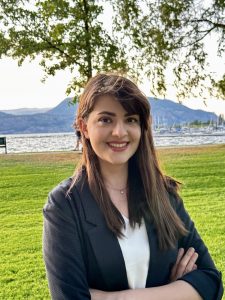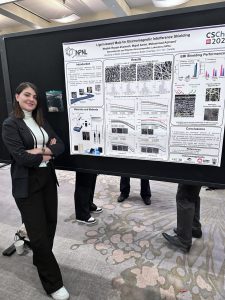
Mojdeh Rezaei-Khamseh, Master of Applied Science Student at UBCO.
Meet Mojdeh Rezaei-Khamseh: a Master of Applied Science (MASc) international student in Mechanical Engineering at UBC Okanagan and recipient of the 2025 Dr. Spiro Yannacopoulos International Engineering Student Memorial Award. Mojdeh’s research explores the use of electrospun plant-based materials enhanced with conductive and magnetic fillers to design multilayer structures with high absorption capabilities. With a background in both polymer science and hands-on experimental techniques, Mojdeh brings an interdisciplinary approach to solving environmental and technological challenges. She is passionate about advancing green materials for energy efficiency.
It was Mojdeh’s passion and potentional to contribute greatly to her chosen research field, strong academic performance, and engagement with the UBC community that made her the worthy recipient of the 2025 Spiro Award. In recognition of International Women in Engineering Day, she is one of several women in engineering being spotlighted from the School of Engineering.
Tell us a bit about yourself.
I’m an international graduate student with academic and professional experience across three countries. I completed my first Master’s degree in France, where I specialized in polymer composites and gained industrial experience working on their mechanical characterization. Now, at UBC Okanagan, I am continuing my journey in materials research with a focus on green technologies and sustainable composites. Outside the lab, I’m also passionate about fashion and jewelry making, which nurtured my precision and creativity, skills that carry over into my research.
Tell us about your academic journey leading up to your MASc studies.
My academic path began with a Bachelor’s in Materials Engineering in Iran. I then pursued a Master’s degree in France, where I gained hands-on research and industry experience in polymer-based composites, especially their mechanical performance. These experiences laid the groundwork for my current research interests. Coming to UBCO has allowed me to combine that foundation with innovative nanotechnology and sustainability goals.
What inspired you to pursue a Master of Applied Science degree, and why did you choose UBC Okanagan for your graduate studies?
After gaining research and industry experience, I realized I wanted to take a more research-intensive path to explore sustainable materials. The MASc program at UBC Okanagan offered the perfect balance of hands-on lab work, advanced facilities, and a focus on real-world impact. Dr. Arjmand’s group stood out for its cutting-edge work on nanocomposites and electromagnetic shielding, aligning closely with my interests and background.
“The MASc program at UBC Okanagan offered the perfect balance of hands-on lab work, advanced facilities, and a focus on real-world impact.”
Tell us about your research.
We’re constantly surrounded by electronics that emit invisible electromagnetic waves. These waves can interfere with one another and even pose safety risks. My research focuses on making a special fabric-like material from lignin (a natural byproduct from plants) that absorbs these waves instead of reflecting them. Over 5 billion kilograms of lignin are burned every year as waste, and we’re working to valorize it, that is, transform it into something valuable and functional. It’s like creating a biodegradable noise-cancelling blanket for electronics, which is light, flexible, and eco-friendly.

Mojdeh at a conference beside her research.
What has been the most rewarding part of your UBCO experience?
For me, it’s been the opportunity to work in a collaborative and well-equipped research environment. From designing experiments to analyzing results and sharing them at conferences, every step has helped me grow as a researcher. The mentorship and peer support have been especially valuable. I’ve also worked alongside incredibly experienced peers and received invaluable mentorship from my supervisor and senior lab members, especially when I was new to UBCO. I’ve been involved in programs like WISE (Women in Science and Engineering), first as a committee member and soon, I hope, as a mentor; this sense of community has made a huge difference.
What challenges have you faced during your time at UBC, and have you grown or adapted as a result?
Adjusting to a new academic environment in Canada after studying in France and Iran came with its own learning curve. Balancing coursework, research, and personal life, especially as an international student, was challenging. But it has made me more independent, confident, and adaptable in both academic and personal dimensions. Joining campus associations and volunteer programs like Let’s Talk Science helped me integrate, build leadership skills, and connect with others; even mentoring kids through science activities was a joyful and empowering experience.
What advice would you give to prospective or incoming UBCO students?
Stay curious and proactive. Don’t be afraid to approach professors or seek help. Take full advantage of the facilities and interdisciplinary opportunities. Joining campus associations and volunteer programs like Let’s Talk Science helped me integrate, build leadership skills, and connect with others; even mentoring kids through science activities was a joyful and empowering experience.
“Your initiative will define your experience more than anything else.”
How has your experience in the MASc program prepared you for your career or future academic goals?
The MASc program has sharpened my technical skills in areas like electrospinning, material characterization, and nanocomposite fabrication. More importantly, it’s trained me in critical thinking, scientific writing, and independent research. I now feel well-prepared for either a research-driven industry role or further academic study at the PhD level.
Have you had opportunities to present your research (e.g., conferences, publications, workshops)? If so, what have you learned from those experiences?
Yes, I’ve presented my work at multiple conferences, including a poster session at the UBC Bioproducts conference and the CCEC (Canadian Chemical Engineering Conference) in Toronto. I’m also in the final stages of preparing a manuscript for submission to the Advanced Functional Materials journal. The paper focuses on my project of lignin valorization. Presenting has helped me improve my ability to explain complex research clearly and confidently both to experts and non-specialists.
If you could give your past self one piece of advice before starting your MASc journey, what would it be?
Trust your pace and process. It’s okay not to have all the answers right away. Research is about discovery, persistence, and continuous improvement.
“Trust your pace and process. It’s okay not to have all the answers right away. Research is about discovery, persistence, and continuous improvement.”
Is there anything else you’d like to share about your experience as a graduate student in engineering?
Graduate school is as much about self-growth as it is about academic achievement. It’s a chance to challenge yourself, think critically, and build a foundation for impactful work, especially in fields like sustainable engineering, where the world truly needs innovative minds.
As we approach International Women in Engineering Day on June 23, 2025, we asked Mojdeh to reflect on her experiences as a woman in engineering.
As a woman in engineering, how has your perspective shaped your experience or purpose in the field, and what shifts are you seeing today?
As a woman in engineering, I’ve felt the challenges deeply—often to the bone—at every stage of my academic life. These experiences have shaped not just how I navigate the field, but also how I support others within it. I’ve served as a committee member for the Women in Science and Engineering (WISE) program at UBC Okanagan and have actively volunteered for numerous women-led initiatives such as Dress For Success. Through these roles, I’ve witnessed both the systemic barriers and the strength of community-driven progress. Encouragingly, I’ve also observed a gradual cultural shift, more inclusive spaces, more visibility for women, and growing momentum for change.
Are there women in engineering whose work or journey has inspired your own?
Definitely, one of my role models is Anousheh Ansari, an engineer and the first Iranian woman in space. Her journey from a young girl passionate about the stars to a spaceflight engineer who actually fulfilled that dream has resonated with me on a personal level; I’ve always loved astronomy and deeply miss my telescope. These women remind me that no dream is too distant when pursued with determination.
What advice would you share with the next generation of women and underrepresented voices entering engineering?
Own your story and never underestimate your potential. There will be moments when the path feels isolating or unfair, but you are not alone. Surround yourself with those who uplift you, find mentors, and don’t be afraid to speak up. Your presence in engineering is not only valid, it’s essential to shaping a better, more equitable future in science and technology.
“Your presence in engineering is not only valid, it’s essential to shaping a better, more equitable future in science and technology.”